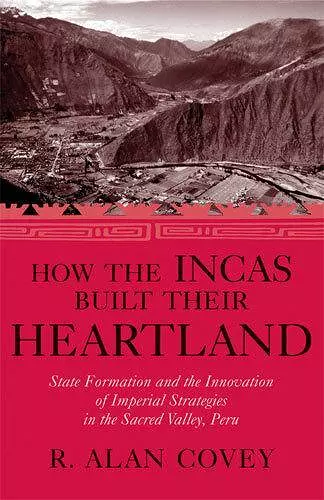How the Incas Built Their Heartland
State Formation and the Innovation of Imperial Strategies in the Sacred Valley, Peru
Format:Hardback
Publisher:The University of Michigan Press
Published:24th Apr '06
Currently unavailable, and unfortunately no date known when it will be back

Inca archaeology has traditionally been intimately tied to the study of the Spanish chronicles, but archaeologists are often asked to explain how Inca civilization relates to earlier states and empires in the Andean highlands-a time period with little coinciding documentary record. Until recently, few archaeologists working in and around the Inca heartland conducted archaeological research into the period between AD 1000 and AD 1400, leaving a great divide between pre-Inca archaeology and Inca studies.
In How the Incas Built Their Heartland R. Alan Covey supplements an archaeological approach with the tools of a historian, forming an interdisciplinary study of how the Incas became sufficiently powerful to embark on an unprecedented campaign of territorial expansion and how such developments related to earlier patterns of Andean statecraft. In roughly a hundred years of military campaigns, Inca dominion spread like wildfire across the Andes, a process traditionally thought to have been set in motion by a single charismatic ruler, Pachacuti Inca Yupanqui. Taking nearly a century of archaeological research in the region around the Inca capital as his point of departure, Covey offers an alternative description of Inca society in the centuries leading up to imperial expansion. To do so, Covey proposes a new reading of the Spanish chronicles, one that focuses on processes, rather than singular events, occurring throughout the region surrounding Cusco, the Inca capital. His focus on long-term regional changes, rather than heroic actions of Inca kings, allows the historical and archaeological evidence to be placed on equal interpretive footing. The result is a narrative of Inca political origins linking Inca statecraft to traditions of Andean power structures, long-term ecological changes, and internal social transformations. By reading the Inca histories in a compatible way, Covey shows that it is possible to construct a unified theory of how the Inca heartland was transformed after AD 1000.
R. Alan Covey is Assistant Professor of Anthropology at Southern Methodist University.
"Skillfully researched and written, this book sets a bold new direction for the study of ancient states and empires."
—Brian S. Bauer, Professor of Anthropology, University of Illinois at Chicago
"The mystique of the Inca empire has rested on its vast size, remarkable citadels clinging to steep mountain slopes, amazing stone architecture—and to the apparent rapidity with which it arose. In dispelling the mystery of its rapid rise with evidence for a centuries long process of development within the imperial heartland near Cuzco, this book contributes greatly to our understanding of the Inca achievement."
—Craig Morris, Curator of South American Archaeology, American Museum of Natural History
"This eye opening book offers a new and utterly convincing explanation of the origins and development of the Inka state. Integrating archaeological with ethno historical evidence, Alan Covey describes a process of Inka state formation that extended over centuries. Meticulous review of existing scholarship joins hands with original archaeological and archival research. The work is both pioneering and authoritative, and will have a long term impact. For scholars of Andean antiquity, the book is a must read, and others studying early or archaic empires will find here thought provoking and illuminating material for comparison and contrast."
—Sabine MacCormack, University of Notre Dame
"In this volume, Covey makes a major contribution to Andean studies and, more broadly, the study of pre-Hispanic state formation and imperialism."
—The Americas
"Covey's integrative approach convincingly presents Inca imperial expansion not as the creation of a 'single charismatic individual' or a miraculous event, but as the contingent outcome of enduring traditions and strategies that developed over generations."
—The Americas
ISBN: 9780472114788
Dimensions: unknown
Weight: unknown
352 pages